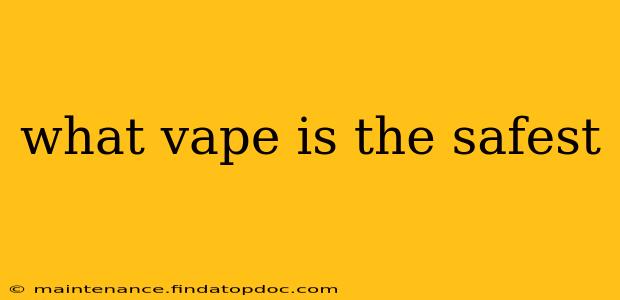The question of the "safest" vape is complex and doesn't have a simple answer. There's no vape that's entirely safe, as all vaping products involve inhaling aerosolized substances into your lungs. However, some options are demonstrably less harmful than others, and understanding the nuances is crucial for making informed decisions. This guide will explore various factors influencing vaping safety and help you assess the risks involved.
Understanding the Risks:
The primary concern with vaping isn't necessarily the device itself, but rather the contents of the e-liquid. Harmful chemicals can be present in varying concentrations depending on the brand, ingredients, and nicotine strength. The long-term health effects of vaping are still under investigation, but emerging research links vaping to several potential health issues, including respiratory problems, cardiovascular issues, and potential links to certain cancers.
What are the safest vaping devices?
The "safest" device isn't defined by a specific brand or model. Instead, safety hinges on several factors:
-
Type of E-liquid: Nicotine-free e-liquids containing only food-grade flavorings pose significantly fewer risks than those containing nicotine or other additives. However, even flavorings can contain potentially harmful substances, so always research the specific ingredients. Look for brands that provide detailed ingredient lists and third-party lab testing results.
-
Device Type: Simple, non-temperature-controlled devices are often considered safer than advanced mods with high-wattage capabilities. High-wattage vaping creates more aerosol, potentially leading to greater inhalation of potentially harmful substances.
-
Usage Patterns: Frequency and intensity of vaping significantly influence potential health risks. Less frequent vaping and using lower nicotine strengths (or avoiding nicotine entirely) reduce potential harm.
What e-liquids are safest?
The safest e-liquids generally contain:
- No Nicotine: Nicotine is highly addictive and has several negative health impacts.
- Vegetable Glycerin (VG) and Propylene Glycol (PG): These are the primary bases for most e-liquids and are generally considered safe when used in food-grade quality. However, individual sensitivities can exist.
- Natural and Food-Grade Flavorings: Look for e-liquids that explicitly state they use natural flavorings and avoid artificial sweeteners.
Are there safer ways to vape?
Yes, several practices can minimize risks:
- Choose reputable brands: Look for established brands with transparent sourcing and testing of their products.
- Avoid unregulated products: Purchase e-liquids and devices from licensed retailers to ensure quality control and ingredient safety.
- Start with lower nicotine levels: If using nicotine, begin with lower concentrations and gradually increase only if needed.
- Read reviews: Before purchasing any vaping products, read reviews from other users to gain insights into their experiences.
- Practice good hygiene: Regularly clean your device to prevent bacterial contamination.
Is vaping safer than smoking?
While vaping is often presented as a "safer" alternative to smoking, it is crucial to understand that this is a relative statement, not an absolute one. Numerous studies suggest vaping is less harmful than smoking traditional cigarettes due to the absence of combustion and the reduced levels of many carcinogens. However, vaping is still not risk-free.
What are the long-term effects of vaping?
The long-term effects of vaping are still being researched. While some studies suggest reduced risks compared to smoking, potential long-term health consequences, including respiratory and cardiovascular issues, are areas of ongoing investigation.
How can I quit vaping?
Quitting vaping, like quitting smoking, requires commitment and support. Options include nicotine replacement therapy (NRT), counseling, and support groups. Consulting a healthcare professional is recommended to develop a personalized cessation plan.
Disclaimer: This information is intended for educational purposes only and does not constitute medical advice. Consult a healthcare professional for personalized guidance on vaping and related health concerns. The information provided here reflects current research and understanding, and new findings may emerge over time.
